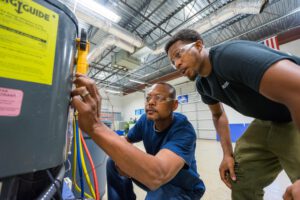Becoming an HVAC Technician
HVAC technicians may work in a variety of settings, including homes, businesses, and construction sites. Their workloads vary widely, and they often lift and move heavy equipment. They may also spend some time on rooftops or in confined spaces, such as ducts. They may also work outdoors or in a variety of other settings, including inclement weather. HVAC technicians can work as self-employed contractors or as employees of construction companies. This field requires flexibility, and they must adhere to safety standards and security measures.

Regardless of your level of education, becoming an HVAC technician is a lucrative career choice. The demand for technicians in this field is on the rise, and the job description is always expanding. According to the Bureau of Labor Statistics, there will be an estimated 4% growth in the field through 2029. However, many employers may prefer candidates who have a postsecondary degree in HVAC, and some may hire apprentices to learn the trade. In both cases, an apprenticeship program helps you learn the trade while earning gaining valuable hands-on experience. Read on HVAC Company to learn more about HVAC technicians.
The minimum education requirements for an HVAC technician are a high school diploma and at least one year of experience in the field. A technician must have a thorough understanding of advanced HVAC principles, as well as the ability to perform basic troubleshooting, repairs, and sales. It is also important to be physically fit and have a clean driving record. A background check is also required. The job outlook for HVAC technicians is favorable, and the Bureau of Labor Statistics projects that the occupation will grow by 15% through 2026.
Apprenticeships in the field are also an option, although they are not always available. The apprenticeship program can last anywhere from three to five years and can help you develop valuable technical knowledge. During the trial period, some employers will even pay the apprentice, providing the student performs well. After a successful trial period, a full-time HVAC technician should be able to secure a job in the field. It is a great way to learn about the industry.
As an HVAC Technician, you will be responsible for preventing and solving problems. A technician must also work closely with engineering and sales departments to improve products and services. HVAC technicians use a variety of tools to do their work. While hand tools and basic tools are necessary for installation, advanced HVAC technicians use combustion analyzers, voltmeters, and acetylene torches to test system components. You should also be aware of safety regulations regarding the use of chemicals in HVAC systems.
To become an HVAC technician, you will need a high school education or a GED. A college degree program will teach you general education skills, while an apprenticeship will teach you the technical skills necessary to operate HVAC equipment. However, most employers prefer to hire individuals with apprenticeship training. Apprenticeships generally last between three and five years and are provided by vocational schools or trade unions. Some apprenticeships lead to nationally recognized certification. Once you have completed the program, you will have a valuable resume to impress potential employers.
An HVAC technician needs to be physically fit to work safely and properly. The job demands lifting heavy equipment, climbing ladders, crawling through tight spaces, and using hand tools. In addition, certain tasks require a license from the Environmental Protection Agency. You should also be aware of the requirements that will apply to your state. If you meet these requirements, you may be able to get a job in a high-demand field.
The job description of an HVAC technician varies from one position to another. You may be asked to install and maintain hybrid heat pumps, self-contained ground source heat pumps, and other types of HVAC/R equipment. This position will also require you to perform maintenance checks on your HVAC system on a regular basis, and you may need to be certified in refrigerant handling as well. In addition to performing maintenance checks, your technician will also check the operation of your thermostat and blower fan.
